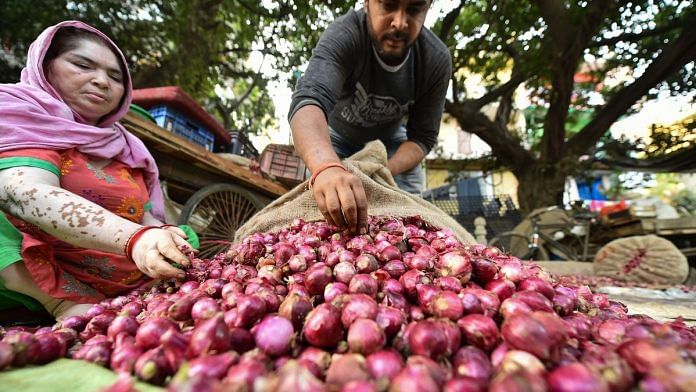New Delhi: The Narendra Modi government’s decision to relax fumigation norms for imported onions might result in the entry of disease-carrying onions and harmful pests in Indian markets, agriculture experts have told ThePrint.
On 6 November, the agriculture ministry relaxed fumigation norms and waived the penalty for non-compliance until 30 November, which was later extended up to 31 December. The move came in a bid to improve the key staple’s domestic supply and check prices that had soared to Rs 100 per kg.
According to the 2003 plant quarantine order, the phytosanitary and fumigation process — treatment carried out to prevent import of weed/alien species in the form of pests and diseases — is mandatory for the exporting countries to get done at their end.
With the relaxation in rules for onion, these processes can be performed upon their arrival at Indian ports, and there won’t be a penalty of quadruple inspection fee on importers over non-compliance.
Entomologists and agriculture sector experts said the government’s move will have far-reaching consequences on the agro-climatic biodiversity of India, including plants other than onion, and could impact consumer health also.
Issues with relaxation
Vadivelu Karrupaiah, scientist, agricultural entomology, Directorate of Onion and Garlic Research, Pune, said stringent norms are made in the first place to ensure there is zero scope left for entry of alien pest or disease through any import in India.
“The government should not have relaxed fumigation norms in any manner,” he said.
Even if the fumigation and phytosanitary spray happens at the end of importer, there is a high chance of pest and disease infestation during transit or upon arrival, said Karrupaiah.
“This has to be tackled by overt use of pest and disease combating chemicals for storage of onion until consumption. This has a high chance of leaving cancer or skin disease causing materials in it,” he said.
“When a plant product is imported in large quantity it’s difficult to ascertain whether or which kind of pest it is infected with as most of them reside in the root of the plant. Root-knot nematode is an example, which drastically reduces yield,” said a senior entomologist at the Indian Council of Agricultural Research (ICAR), who did not wish to be named.
The ICAR entomologist said onions coming from Egypt — a major onion exporter — have a risk of introducing purple blotch disease in the onion plant and Onion Thrips pest into Indian soil. Another major threat comes from white rot disease, he added.
“It (white rot disease) is a serious threat to onions and garlic worldwide and a major limiting factor in the production of both crops in Egypt. The first reference of it was discovered in 1922 in Egypt. Since then, the disease has risen dramatically and can cause yield losses of up to 80 per cent for onion and garlic,” added the expert.
Once a diseased crop enters India, farmers will have to use more than the required amount of pesticide to check it from spreading.
“This could leave carcinogenic residue in the product (onion),” said the entomologist.
Also read: Rising onion prices are fuelling India’s inflation, not low interest rates
‘Not enough infrastructure’
According to the Modi government’s order from earlier this month, traders who are importing onions without phytosanitary certification will be allowed to fumigate through an accredited treatment provider in India.
Quarantine officials will inspect the onion shipments reaching India and will release it only if the consignments are free from pests and diseases.
But traders who import onion said there is hardly any infrastructure available in India to fumigate onions.
“We never do fumigation or any pest related spray on the onions we import as it has always to be done by exporter. There is no such practice or infrastructure for onion import after 2003 when the government came out with the plant quarantine order,” said Sanket Shelke, owner of SS Mariner International Pvt Ltd, a company which imports onion from Turkey.
Onion import by India
With the onion production down this fiscal by 30-40 per cent, according to government estimates, and prices touching almost Rs 100 per kg, the Ministry of Consumer Affairs decided earlier this month to import almost 5,500 metric tonnes (MT) of onions.
Of this, 2,500 MT was to be imported from Egypt and The Netherlands — to arrive in 80 containers in a ratio of 70:10.
Of the total 70 containers coming from Egypt, almost 20-30 are arriving without the fumigation and phytosanitary check, a senior consumer ministry official told ThePrint.
“This means that almost 900 tonnes of onion arriving in India remain susceptible to plant prone pest and disease,” added the official, who did not wish to be named.
That’s not all. If the penalty on onions imported from Egypt for non-compliance with the 2003 order had not been waived, the importers would’ve been forced to pay Rs 3.96 lakh, added the official.
Last week, the government further directed an import an additional 1 lakh MT of onions.
Also read: High time Indian farmers are freed from shackles imposed by 1960s’ food-shortage mindset



